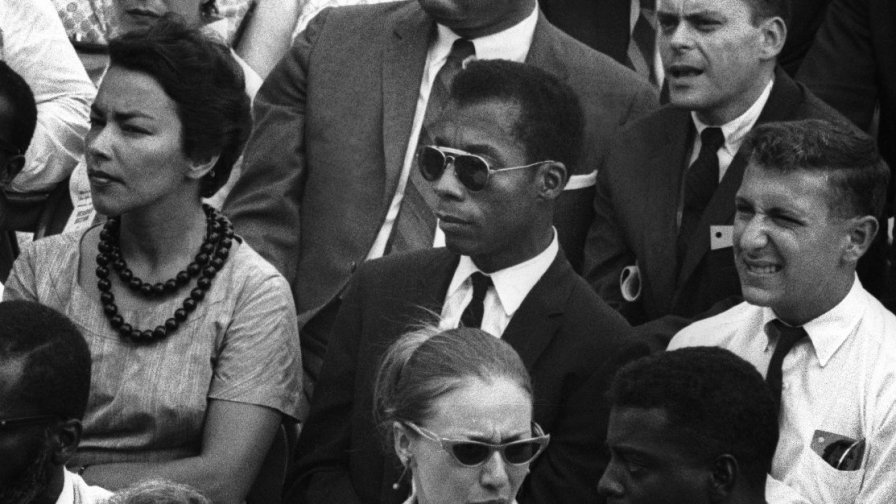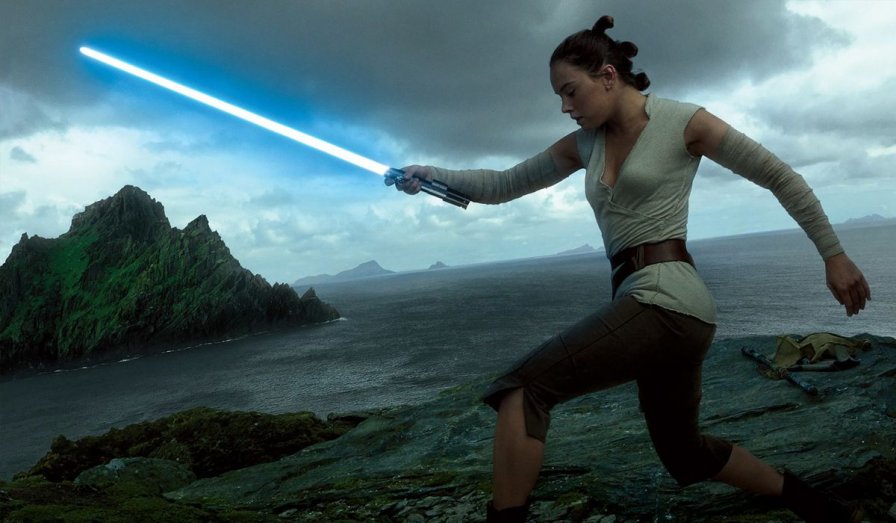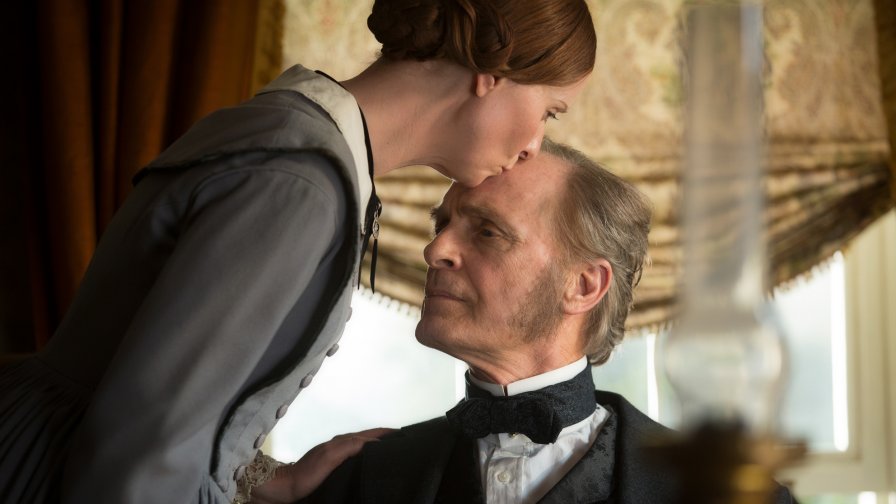Welcome to Screen Week! Join us as we explore the films, TV shows, and video games that kept us staring at screens. More from this series
20
The Meyerowitz Stories
Dir. Noah Baumbach
[Netflix]

Noah Baumbach has been making great films for well over a decade, and The Meyerowitz Stories might be his best. Taking the humor and pathos of his earlier films and entrenching them in a thoroughly modern and relatable story of family pathology, Baumbach offered up a delightful, affecting film here. The best commentary on The Meyerowitz Stories comes from one of its stars, Dustin Hoffman, in an interview with Jimmy Fallon: “It’s basically about a family that doesn’t have religion, but substitutes it with art. And I’m a sculptor who never became as successful as I wanted to be, and these guys suffer because of it… I think what I did to them is what many fathers do to their kids, is they signal them nonverbally not to be better than he is. In other words, not to have more success than the father does. Don’t surpass them.” Hoffman then asked the audience if they could relate to this, and there was a deeply uncomfortable silence. That’s Noah Baumbach for ya.
19
I Am Not Your Negro
Dir. Raoul Peck
[Velvet]

From across the ocean, the history of racism in America always seemed somewhat surreal. Not that racism didn’t exist here, but that the recent history of black struggle in the US was a history of abuse institutionalized to the point of being, as many argue, an integral part of the state, the founding lie of a country claiming freedom as synonymous with it. Raoul Peck told the story of the struggle against that lie through the words of James Baldwin, but it was not a poetic narrative, if poeticism implies detachment from material reality. It is a very personal archive of violence recorded in historical facts, wounds as much private as they are public. By using footage from current events alongside archival recordings, Peck forcefully reminded us that those wounds are still open; more than that, new ones are still collected and ever more blood is spilled. Baldwin’s words become prophetic, but it is a prophecy of Afro-Pessimism, of hopelessness in the face of a world built on exclusion, of anger with no agency to force a change through it. At the end of the film, we were left with a feeling that what Frank Wilderson was saying for years is perhaps true: that this world needs to be torn down in order to open the possibilities for true change.
18
Star Wars Episode VIII: The Last Jedi
Dir. Rian Johnson
[Walt Disney]

Let me paint you a picture of the future. Do you remember that movie you loved from the time you were a child? The one you’ve watched so often it’s become a part of you? Hollywood is going to keep making that movie. Again and again, you’ll drag yourself to the theater, chasing the dragon of that wonder you felt all those years ago, but you’ll leave feeling a little emptier every time. This will go on until you die, and then it will keep going on. Forever. The reason The Last Jedi resonated so deeply with some fans and alienated so many others was because, for a bracing two-and-a-half hours, the film posited an alternative to this future. Rian Johnson refused to cater to his audience’s expectations. Traditions were torn up. Old heros were cast in a new light. Black-and-white moral frameworks were shot through with new shades of gray. The resulting film was flawed, unruly, but it offered something we haven’t seen from a Star Wars movie in a long time: the promise of something different from everything that’s come before. Kylo Ren instructs Rey, “Let the past die. Kill it if you have to.” It’s a motto we wish more film franchises would take to heart.
17
Marjorie Prime
Dir. Michael Almereyda
[Passage]

Memory is messy business. As Tess, slumped over the piano, explains to a slowly pecking Jon, “It’s always getting fuzzier, like a photocopy of a photocopy.” It’s malleable and imperfect as storage, and it terrifies me that so much of my self is constellated around these progressively fuzzier fictions. One day, that self will stretch out into an undifferentiated, gray senility, each instant a dull ache of failed recognition. I saw an acknowledgement of that fear in Marjorie Prime, but also a form of rescue. By way of the Primes — AI-driven holograms of loved ones designed to behave as they did — we can record ourselves and confront our histories, make revisions and rediscover the lost. In talking with the Primes, we converse with ourselves, fashioning the AI as we want it to be, seeking within its generative algorithm the source of our lack, of our doubt, of our grief. Heidegger conceives of technology as a way of revealing truth and the Primes enact a form of rehumanization, bringing us closer to ourselves, drawing from our depths the humanities we have lost from forgetting, be it by effort or accident. In them, there is an archive of the human and of all the concomitant relations. It’s a melancholy notion, being absorbed into the AI, reducing your complexities down into the stream of electrons coursing on the surface of a chip, but, as the film’s close demonstrates, buoyed by Mica Levi’s tender and melancholic score, the work of becoming human persists even after death, as long as the memories are still there.
16
Dunkirk
Dir. Christopher Nolan
[Syncopy Inc.]

In a cultural landscape so utterly consumed with the latent mythos of unchecked nationalism, Dunkirk was a movie we should all have been wary of. Watching the unimaginable horror of generational genocide through the lens of high-budget action setpieces, in which a real-life pop superstar plays a principal role, could be rightfully characterized as “distasteful,” but as far as hegemonic Western war narratives go, Dunkirk was surprisingly considered and inventive. Nolan is gifted as a craftsman of cerebral blockbusters, but with Dunkirk, he tackled his subject with the kind of visceral emotionality he normally struggles to tap into, offering a particularly poignant rebuke of that timeless tendency to dispassionately stitch human sacrifice into the fabric of charismatic jingoism — a thematic thread that could double as an interrogation of the director’s own legacy. It had its flaws of course, but however we problematize it, Dunkirk had the restless contradictions of wartime broiling in its soul, ringing with a special relevance in an era of perpetual, abstract violence from unseen aggressors and a bloodthirsty ruling class giddy with imperialist ambitions. Indeed, with Dunkirk, our historical and cultural tropes shot back.
15
The Lost City of Z
Dir. James Gray
[Amazon Studios]

One of the major films of 2017 to inspire longing for mid-budgeted cinema — nothing too expensive, nothing too cheap — The Lost City of Z was the kind of epic that acknowledged the exoticism and condescension of exploratory, globe-scaling films. Did the problem of the male gaze get fixed? No, but Gray still knew the century in which we live, one where tactile ventures and the willingness to get one’s hands grubby, regardless of race or gender, remained essential. Gray’s big green adventure presented Percy Fawcett as a stolid dreamer, an artist at heart, whose objectives became rigid and unambiguous: to seek within a maligned civilization something worth more than rubber or black gold. The trees moved with the river, while fire roaring against black night became as sumptuous as the elegant interiors. As Fawcett, Hunnam was controlled ambition, never to be as intriguing as the scenery, the sweat, or the support around him: Robert Pattinson as a somewhat reluctant companion (“The jungle is hell, but I kind of like it”), Sienna Miller as Percy’s sturdy wife/collaborator, and Tom Holland as their eldest son.
14
The Death of Louis XIV
Dir. Albert Serra
[The Cinema Guild]

No false advertising here. Albert Serra’s latest gave you exactly what it says on the tin: two hours of the Sun King dying, slowly, in bed. Rather than a tedious terminal longueur, however, The Death of Louis XIV was a marvelous microcosmic synthesis of form and content. It mined the particulars of France’s longest-serving monarch’s protracted death from gangrene to reflect upon the sycophantic spectacle of 17th-century regality and the Cartesian turn to science and reason that would challenge the reign of superstition and ultimately lead to the Age of Enlightenment. By focusing on the corporeal reality of Louis XIV’s decline, Serra stripped the king of his monumental vanity and obliquely addressed the era’s wavering faith in divine right, monarchical absolutism, and the sovereign soul. In this regard, it recalled Jim Crace’s novel Being Dead, while its existential depiction of the stubborn agony of endurance put it in conversation with The Turin Horse. Much of the film’s power derived from Jean-Pierre Léaud, whose own gilded career lent The Death of Louis XIV evocative metatextual resonance; few actors have grown up onscreen the way Léaud has, and the stasis of his riveting performance formed a poignant bookend with the iconic freeze frame of The 400 Blows.
13
A Quiet Passion
Dir. Terence Davies
[Music Box]

Terence Davies’s A Quiet Passion was welcome evidence that artistic innovation and the biopic genre are not, in fact, mutually exclusive. Even more surprisingly, it was proof that a period piece about Emily Dickinson could also be humorous and light on its feet. Lilting timbre and light yet elegiac tone coalesced beautifully in the film’s examination of poetry vs. piety, pitting stoic witticisms yearning for freedom against the unflappable rigors of a staunchly puritanical society. Davies’s visual flourishes reached the heights of his greatest works, particularly the 360° pan in the parlor and the morphing scene that used slow zooms and subtle CGI to transition through decades of time in mere seconds. But as stunning as A Quiet Passion was to look at, verbal language was at its forefront, with wit and relentless philosophical inquiry functioning as armor protecting Emily and her sister from morally righteous clergymen, as well as from the social restrictions and expectations put on women in an era when their independence was seen not simply as an affront, but a direct threat.
12
Personal Shopper
Dir. Olivier Assayas
[IFC]

There were so many things happening simultaneously at any given moment in Personal Shopper it feels like a ludicrous task to distill it all within a single paragraph. Navigating between ghost story, crime thriller, and existential drama, Olivier Assayas’s latest masterwork was a genre-bending exploration of one woman’s personal pursuit of her own identity — an ultra-cool formal experiment into the cinematic art itself — and, of course, a mesmerizing, career-defining performance by Kirsten Stewart. Assayas’s sharp filmmaking skills never allowed Personal Shopper to slip into a vague and insipid formal experiment, having instead crafted one of the strangest, most undefinable, and moving moving films of 2017. Booed at its initial screening in Cannes while praised as a modern masterpiece by others, to say Personal Shopper was divisive is quite the understatement. While distant from anything resembling a crowd-pleaser, there were few films in 2017 quite as daring, idiosyncratic, or relentless in its effort to push the boundaries of the cinematic experience. If nothing else, Personal Shopper was worth it alone for what may be the best texting scene in the history of cinema.
11
Call Me By Your Name
Dir. Luca Guadagnino
[Sony Pictures Classics ]

Call Me By Your Name was a gorgeous ode to the powerful intoxication of infatuation. It spanned its dizzying highs and soulwrecking lows, and did so with impeccable precision. Luca Guadagnino’s film (based on a script by James Ivory, from the book by André Aciman) was a feast for the senses, traversing the incredibly specific time, place, and circumstances of its tale of love in order to become a universal story about discovering oneself in the reflections of another. Timothée Chalamet and Armie Hammer were excellent, playing characters at different stages in life but who both knew themselves and what they wanted. Michael Stuhlbarg too delivered an epically powerful performance as the intuitive and loving father who watched his son cope with defining his identity amid other emotional turmoil. Call Me By Your Name was devastating in its beauty, precise in its depictions, and wholly affecting through the use of sight, sound, taste, and everything else — a bittersweet memory shared with an audience.
Welcome to Screen Week! Join us as we explore the films, TV shows, and video games that kept us staring at screens. More from this series
